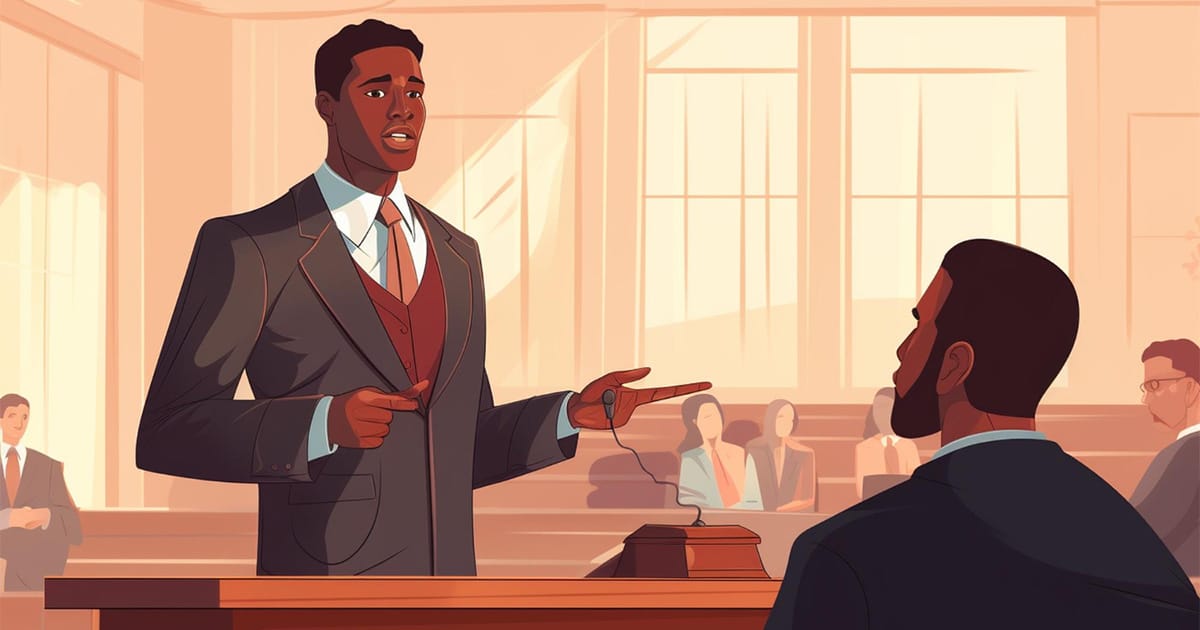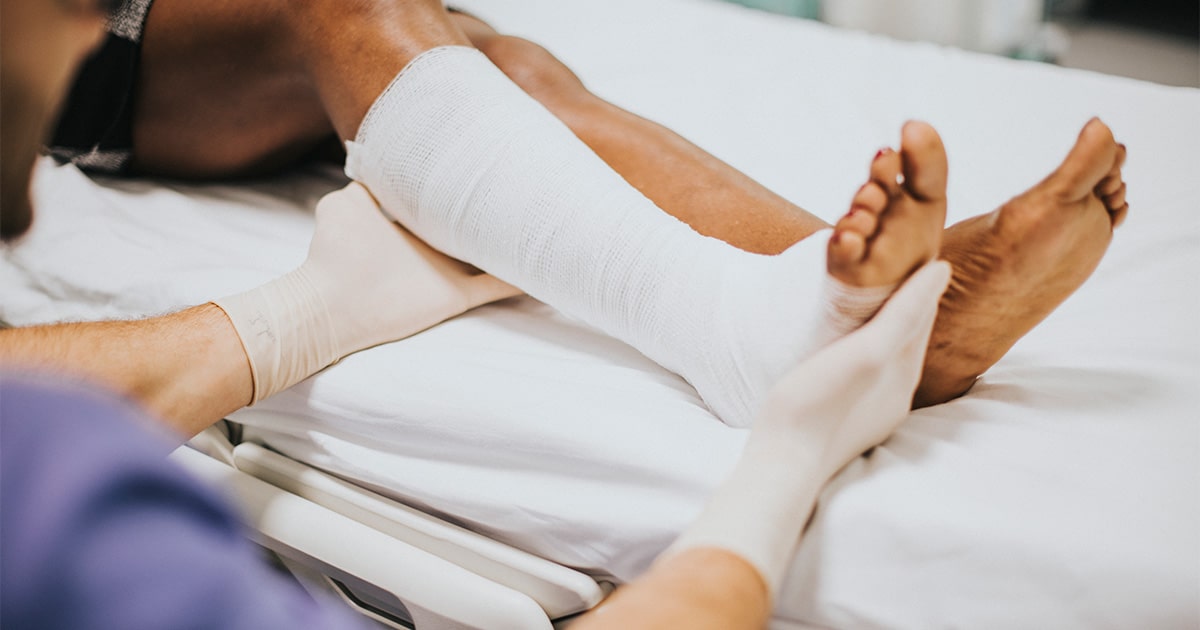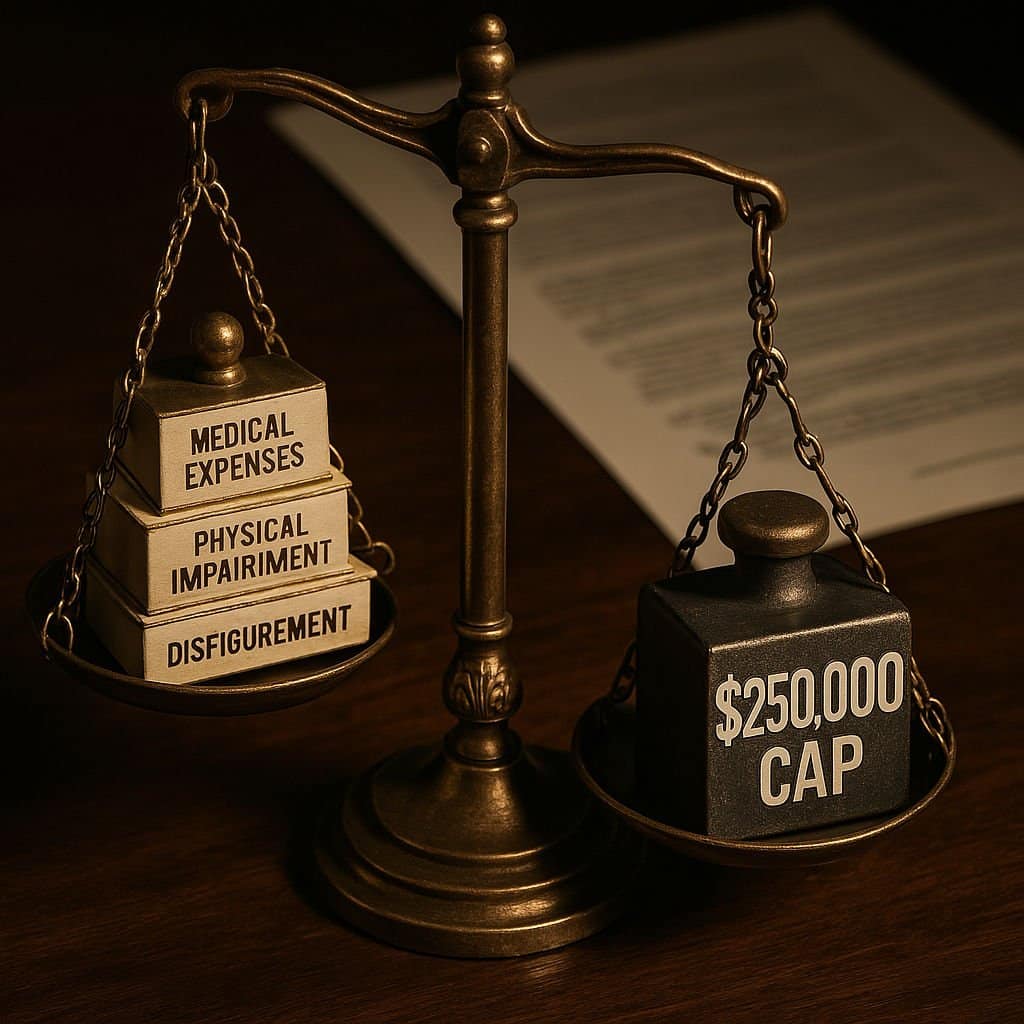Understanding the types of damages in personal injury cases in Oklahoma is crucial when seeking maximum compensation for your injury from an accident.
Personal injury damages is a complex and complicated field of personal injury law that is best left to personal injury legal experts to ensure maximum results.
In Oklahoma, personal injury cases are governed by state law, and individuals who suffer injuries due to the negligent actions of another may be entitled to compensation for their damages. Pain and suffering damage are key components of many personal injury claims, and they refer to the physical and emotional distress that a victim experiences due to their injuries.
This blog post will provide an overview of pain and suffering damages in Oklahoma, including how they are calculated and awarded.
Explanation of Personal Injury Cases
Navigating the realm of personal injury cases requires a keen understanding of the damage involved. When someone suffers harm due to another party’s negligence, they may be entitled to compensation for numerous losses incurred. These losses can range from medical expenses and lost income to intangible damages like pain & suffering.
By grasping the different types of damages in a personal injury case, individuals can better advocate for their rights and ensure they receive fair recompense for their injuries. Economic damages cover tangible financial losses, while non-economic damages address emotional and quality-of-life impacts. Additionally, punitive damages serve as a deterrent against egregious behavior by negligent defendants.
Understanding these facets is pivotal in building a strong case and pursuing maximum compensation. With this knowledge at hand, individuals can navigate the legal process with confidence and seek justice for their injuries.
Types of Damages in a Personal Injury Case in Oklahoma
Economic Damages
When it comes to personal injury cases in Oklahoma, understanding the different types of damage is crucial. In these cases, economic damage plays a significant role in compensating the victim for their financial losses.
Medical Expenses
Medical expenses are a common form of economic damage that can accrue rapidly following an accident. From emergency room bills to rehabilitation and treatment costs, these expenses can add up quickly.
Lost Income and Earning Capacity
Lost income and earning capacity are also important factors in calculating economic damages. If your injuries prevent you from working or earning as you did before the accident, you may be entitled to compensation for this loss.
Property Damage
Property damage is another type of economic damage that can result from an accident. Repairing or replacing damaged property can be costly, and seeking compensation for these expenses is essential in personal injury cases.
Non-Economic Damages
1. Pain and Suffering
Non-Economic Damages in a personal injury case go beyond the financial aspect. They encompass intangible losses that greatly impact one’s quality of life. Pain and suffering can manifest physically, emotionally, and mentally, affecting your daily activities and overall well-being.
2. Emotional Distress
Emotional distress delves into the psychological toll of an injury, encompassing anxiety, depression, PTSD, and other mental health struggles that stem from the accident. It’s about more than just physical pain; it’s about the emotional turmoil you endure.
3. Loss of Enjoyment of Life
Loss of enjoyment of life speaks to how your injuries have limited or stripped away your ability to partake in activities you once loved. It encompasses hobbies, social engagements, and experiences that now feel out of reach due to your injuries.
4. Loss of Consortium
Loss of consortium is unique as it pertains to the impact on relationships with a spouse or partner due to the injuries sustained. It addresses the loss of companionship, intimacy, support – elements crucial for a fulfilling partnership.
Punitive Damages
Punitive damages serve a unique purpose in personal injury cases. These damages aim to punish the defendant for their intentional misconduct or gross negligence, rather than compensating the victim. In Oklahoma, punitive damages are not awarded lightly; certain criteria must be met for them to be considered by the court.
Criteria for Awarding Punitive Damages in Oklahoma
The criteria for awarding punitive damages in Oklahoma typically involve proving that the defendant acted with malice, fraud, oppression, or recklessness. This means that the conduct of the defendant must have been beyond mere negligence and demonstrated a willful disregard for the safety and rights of others. The intention is to deter similar behavior in the future and send a message that such actions will not be tolerated.
When pursuing punitive damages in a personal injury case in Oklahoma, it is crucial to have strong evidence supporting your claim of egregious conduct on behalf of the defendant. Working closely with an experienced attorney who understands these legal nuances can greatly increase your chances of successfully obtaining punitive damages as part of your overall compensation package.
Factors Affecting Damages Awarded
- Severity of Injury
- Impact on Daily Life and Future
- Duration of Recovery
- Comparative Fault
The damages awarded in a personal injury case can vary based on several key factors that are carefully considered during the legal process. The severity of the injury plays a crucial role in determining the compensation amount. More severe injuries often result in higher damages being awarded to cover medical expenses and other losses.
The impact of the injury on daily life and future prospects is also taken into account. If an injury significantly hinders a person’s ability to work or enjoy life as they did before, it may lead to higher non-economic damages such as pain and suffering.
Additionally, the duration of recovery is another factor that influences the damages awarded. Longer recovery times may result in increased compensation to account for ongoing medical treatments and lost income during this period.
Comparative fault is considered when determining damages. If it’s found that multiple parties share responsibility for an accident, this could affect the final award amount granted to each party involved in the case.
Case Examples and Precedents
Cases illustrating significant economic damages
Case Examples and Precedents can shed light on the intricacies of personal injury cases. In Oklahoma, there have been instances where significant economic damages were awarded to accident victims. These cases showcase the importance of accurately assessing medical expenses, lost income, and property damage to ensure fair compensation.
Cases highlighting non-economic damages
On the other hand, there are examples highlighting non-economic damages in personal injury cases. These cases delve into pain and suffering, emotional distress, loss of enjoyment of life, and loss of consortium – factors that go beyond financial losses but greatly impact a victim’s well-being.
Cases involving punitive damages
Furthermore, some cases involve punitive damages aimed at punishing defendants for intentional wrongdoing or gross negligence. Understanding how punitive damages are determined in Oklahoma can provide insight into seeking justice beyond compensatory measures.
Legal Process for Seeking Damages
- Filing a Claim
- Negotiations and Settlements
- Trial Proceedings
- Appeals Process
Filing a claim for damages in a personal injury case is the initial step towards seeking compensation. This involves submitting legal documents outlining your injuries and the circumstances surrounding the accident. It’s crucial to provide detailed evidence to support your claim.
Negotiations and settlements often follow, where parties attempt to reach a resolution without going to trial. During this process, both sides may present arguments and counteroffers to reach a fair settlement amount that adequately compensates for the damages incurred.
If negotiations fail, the case may proceed to trial proceedings. Here, evidence is presented before a judge or jury who will determine liability and assess appropriate damages based on the facts of the case.
In some instances, either party may choose to appeal the court’s decision if they believe errors were made during trial proceedings. The appeals process involves presenting arguments before a higher court challenging aspects of the original ruling in hopes of obtaining a different outcome.
Recap of Damages in Personal Injury Cases
Understanding the types of damages you can receive for a personal injury case is crucial. From economic to non-economic and punitive damages, each plays a vital role in compensating for your losses.
Importance of Legal Representation
Having legal representation can significantly impact the outcome of your case. A knowledgeable attorney can navigate the complexities of personal injury law, negotiate with insurance companies, and ensure you receive fair compensation.
Final Thoughts on Pursuing Damages in Oklahoma
When pursuing damages in Oklahoma, it’s essential to have a clear understanding of the different types available and how they apply to your specific situation. By seeking legal counsel early on, you can protect your rights and maximize the compensation you deserve.
Understanding the types of damages you can receive for a personal injury can help ensure insurance companies do not take advantage of you. Before settling an injury claim, it is wise to talk with a lawyer about your case. The insurance company always undervalues damages to avoid paying the total value of a personal injury claim.
Knowing the types of damages available in a personal injury case is crucial to protect your rights. Insurance companies often try to downplay the true value of your claim, leading you to receive less compensation than you deserve. By understanding and being aware of the different types of damages, you can ensure that insurance companies do not take advantage of your situation.
Before hastily settling an injury claim, it’s important to seek legal advice from an experienced attorney who can assess the full extent of your damages and advocate on your behalf. A lawyer can help navigate the complexities of personal injury cases and negotiate with insurance companies for fair compensation.
Don’t let insurance adjusters undervalue your damages or rush you into a settlement. Take control of your case by seeking professional guidance and standing up for what you rightfully deserve in terms of compensation for your injuries.
Once you sign a settlement agreement, it is too late to demand more money. Even if you discover another injury or more damages, you have waived your right to pursue additional claims. Therefore, make sure the amount you agree to accept for settlement is the highest amount possible for your case.
Signing a settlement agreement in a personal injury case is a crucial decision. Once you sign on the dotted line, it’s binding, and you can’t go back to renegotiate for more compensation. This means that if you later discover additional injuries or damages, you won’t be able to seek further financial recovery from the at-fault party or their insurance company.
It is essential to thoroughly assess the full extent of your injuries and damages before agreeing to any settlement amount. Consulting with a knowledgeable personal injury attorney can help ensure that you are not leaving money on the table and that you are receiving fair compensation for your losses.
Remember, once the settlement is finalized, there’s no turning back. So take your time, gather all necessary information about your injuries and losses, and negotiate for the highest possible amount to cover your current and future expenses related to the accident.

Compensatory Damages in a Personal Injury Case
Compensatory damages for a personal injury case are divided into two categories: economic damages and non-economic damages. Economic damages compensate an accident victim for financial losses caused by the accident and injuries. General damages (non-economic damages) compensate the person for the pain and suffering caused by the accident or injury. Examples of the types of damages you could receive for your personal injury claim include:
Medical Bills and Expenses
Medical expenses can be significant in personal injury cases. The more severe the injury, the higher the medical costs. Examples of medical losses included in injury claims include:
- Emergency room and ambulance bills
- Cost of diagnosing injuries, including CT scans, MRIs, and other diagnostic tests
- Bills from physicians, labs, hospitals, and other medical providers
- Cost of surgery and rehabilitation therapies
- Home health care costs
- Prescription drugs and over-the-counter medications
- Mobility devices and medical equipment
- Nursing and personal care
- Medical supplies
An insurance company may argue that medical expenses were not reasonable or necessary. We refute those arguments with statements from your doctors and medical experts. We can also show cost-comparison data to justify an expense.
Lost Wages and Benefits
If you cannot work because of your injuries, you are entitled to compensation for loss of income. Loss of income includes, but might not be limited to:
- Wages
- Overtime pay
- Commissions
- Salaries
- Bonuses
- Benefits
- Retirement contributions
- Tips
- Part-time wages from second and third jobs
- Self-employment income
Loss of income includes any compensation you would have earned if not for your injuries. However, you have the burden of proving that you would have earned that income and how much the income would have been if you had been able to work.
When it comes to personal injury cases, compensatory damages play a crucial role in helping victims recover from financial losses. These damages are typically categorized into economic and non-economic damages. Economic damages aim to compensate for the measurable financial impact of the accident and resulting injuries.
Medical bills and expenses can quickly add up in personal injury cases, especially with severe injuries. From emergency room costs to rehabilitation therapies and prescription medications, these expenses are vital components of a compensation claim.
Lost wages and benefits also form part of compensatory damages. If you’re unable to work due to your injuries, you deserve compensation for the income you’ve lost. This includes wages, bonuses, retirement contributions, and even self-employment income that would have been earned if not for the accident.
Proving these economic losses is essential in securing fair compensation for your personal injury case. Whether it’s justifying medical expenses or demonstrating potential earnings through wage documentation, thorough evidence is key in maximizing your compensatory damages.
Permanent Impairments and Disabilities
If you sustain disabilities or impairments because of an accident, you may receive compensation for loss of use. Loss of use refers to the inability to enjoy certain activities or perform specific tasks. It includes the changes to your lifestyle and quality of life caused by the impairments.
You may also be entitled to compensation for future damages based on permanent impairments. For example, you may receive compensation for ongoing medical, nursing, and personal care or future lost wages and diminished earning potential. Diminished earning potential is the difference between what you could have earned before the accident and what you can earn now.
Suffering permanent impairments or disabilities due to an accident can significantly impact your life. It goes beyond physical limitations; it affects your ability to engage in daily activities and enjoy the things you once loved. These changes can alter your lifestyle and diminish your quality of life.
Compensation for such losses may extend to future damages related to the lasting effects of these impairments. This could include ongoing medical treatments, nursing care, or adjustments needed for daily living. Additionally, you might be entitled to compensation for diminished earning potential caused by your condition.
Understanding the long-term consequences of permanent impairments is crucial when seeking compensation in a personal injury case. It’s about ensuring that you are adequately compensated for not only current challenges but also future obstacles resulting from the accident-induced disabilities.
Pain and Suffering Damages
Pain and suffering include a wide variety of damages related to your:
- Emotional distress
- Physical discomfort
- Mental anguish
It also includes the loss of enjoyment of life and reductions in your quality of life. Emotional distress can include PTSD, anxiety, and depression. Mental anguish may include embarrassment and grief over significant scarring or disfigurement.
There is no statutory formula used to calculate the value of pain and suffering damages. However, many insurance companies use a multiplier based on the severity of your injuries. They multiply the total financial losses by the multiplier to value pain and suffering damages.
Dealing with pain and suffering after an injury goes beyond physical discomfort; it delves into the realm of emotional distress and mental anguish. The impact can be profound, affecting your quality of life and diminishing your enjoyment of daily activities. Emotional distress may manifest as PTSD, anxiety, or depression, while mental anguish could encompass feelings of embarrassment or grief resulting from visible scars or disfigurement.
Calculating the value of pain and suffering is not a straightforward process since there’s no fixed formula for it. Insurance companies often utilize a multiplier based on the severity of injuries to determine these damages. By multiplying your total financial losses by this factor, they assign a monetary value to your pain and suffering experiences in the aftermath of an accident.

What Are Pain and Suffering Damages?
Pain and suffering damages are a form of compensatory damages aimed at providing relief to victims for the physical and emotional distress they have endured due to an injury. These damages focus on the non-economic aspects of a victim’s suffering, recognizing the significant impact an injury can have on their overall well-being and quality of life. By offering a sense of justice and restitution, pain and suffering damages aid victims on their path to recovery and closure.
In contrast to economic damages, which reimburse victims for tangible losses like medical expenses and lost income, pain and suffering damages address the more subjective aspects of an individual’s suffering. This compensation acknowledges that the consequences of an injury go beyond financial concerns, encompassing emotional turmoil, distress, and a diminished ability to enjoy life. Quantifying pain and suffering damages are inherently complex and challenging due to the personal nature of these consequences.
Determining the appropriate amount involves considering factors such as the injury’s severity, its impact on the victim’s daily life, and the emotional distress experienced. With no fixed formula for calculating these damages, the final award amount often depends on the judge or jury’s discretion, leading to a wide range of potential outcomes. As a result, legal professionals must present persuasive evidence and arguments to ensure their clients receive fair and just compensation for their pain and suffering.
Types of Pain and Suffering Damages
In Oklahoma, the legal system acknowledges two distinct categories of pain and suffering damages: physical pain and suffering and mental pain and suffering. These classifications address the various ways an injury can affect a victim’s life, with each type focusing on specific aspects of the victim’s experience. By differentiating between these two forms of pain and suffering, the law ensures comprehensive and fair compensation for the injured party, considering the full spectrum of their physical and emotional distress.
Physical pain and suffering damages aim to compensate a victim for the physical pain, discomfort, and bodily harm resulting from their injuries. These damages encompass the initial pain and discomfort associated with the injury and any ongoing pain, discomfort, or physical limitations that may persist during recovery. When determining the appropriate compensation for physical pain and suffering damages, factors such as the severity and duration of the physical pain and its impact on the victim’s daily activities and overall quality of life are considered.
Calculating Pain and Suffering Damages
Calculating pain and suffering damages is a subjective process that requires careful consideration of various factors, including the severity of the injuries, the extent of the pain and suffering experienced, and the impact the injuries have had on the victim’s life. In Oklahoma, juries are guided by a set of criteria to help them determine the appropriate amount of pain and suffering damages to award. These factors encompass a wide range of elements related to the victim’s circumstances, providing a holistic approach to evaluating the extent of their suffering and the compensation they deserve.
When determining the amount of pain and suffering damages, Oklahoma juries are instructed to consider the following factors:
- The nature and extent of the injuries sustained by the victim
- The physical pain and mental anguish suffered in the past, as well as the pain and anguish that will likely be suffered in the future
- The degree of suffering and loss of enjoyment of life experienced in the past and that which will probably be experienced in the future
- The disfigurement or impairment of physical or mental capacity resulting from the injury
- The reasonable expenses of necessary medical care, treatment, and services incurred as a consequence of the injury
- The loss of earnings and earning capacity suffered in the past and that which will likely be suffered in the future
- The victim’s age, physical condition, and activity level before and after the injury
It is important to note that in Oklahoma, pain and suffering damages are subject to a cap of $350,000. However, there are exceptions to this cap. If the injury is deemed catastrophic or permanent, the cap is lifted, allowing for potentially higher compensation to be awarded to the victim. This cap exception reflects the recognition that certain injuries may have an even more profound and long-lasting impact on a victim’s life, warranting additional compensation to help alleviate their pain and suffering.
In Oklahoma, personal injury cases are governed by state law, and individuals who suffer injuries due to the negligent actions of another may be entitled to compensation for their damages. Pain and suffering damages are key components of many personal injury claims, and they refer to the physical and emotional distress that a victim experiences due to their injuries. This blog post will provide an overview of pain and suffering damages in Oklahoma, including how they are calculated and awarded.
Proving Pain and Suffering Damages
To obtain pain and suffering damages in Oklahoma, a victim must establish that their injuries resulted from the negligence of another party. This generally entails collecting various forms of evidence, such as medical documentation, witness accounts, and expert analyses, to illustrate the severity of the injuries and their effects on the victim’s life.
A skilled personal injury lawyer can assist victims in constructing a robust case for pain and suffering damages by collaborating with medical experts and other professionals to demonstrate the comprehensive impact of the injury.
Comparative Fault in Pain and Suffering Cases
In Oklahoma, personal injury cases adhere to a modified comparative fault principle, implying that a victim’s damages could be diminished if they are determined to share some responsibility for the accident. When both parties are deemed at fault, the court allocates a percentage of fault to each party and adjusts the victim’s damages proportionately. It is important to note that if the victim is found to bear more than 50% of the responsibility for the accident, they may be ineligible to receive any damages.
Out-of-Pocket Expenses
The economic loss caused by expenses incurred because of the accident or injury. These costs might include:
- Travel expenses to and from medical appointments
- Replacement services, such as hiring someone to perform household chores or childcare
- Cost of overnight travel for medical treatments
Modifications to your home or vehicle because of a permanent disability You need receipts to prove you incurred these costs. You may also need a statement from your doctor explaining why the costs were necessary.
Out-of-pocket expenses can sneak up on you after an accident, adding financial strains to an already stressful situation. From the travel costs to get to medical appointments to hiring help for household chores or childcare, these expenses can quickly add up.
Imagine needing overnight stays for medical treatments or having to modify your home or vehicle due to a permanent disability – these are all real-life scenarios that may require financial investment.
To ensure you can claim these costs as part of your personal injury case, keeping receipts is crucial. These documents serve as tangible proof of the economic losses incurred because of the accident. Additionally, having a statement from your doctor detailing why these expenses were necessary can further strengthen your case.
Navigating out-of-pocket expenses in a personal injury claim requires attention to detail and thorough documentation. It’s essential to account for every cost related to your injuries to seek fair compensation for your economic losses caused by the accident.
Loss of Consortium
Loss of consortium claims compensate an accident victim’s spouse for losses caused by their partner’s injuries. For example, a car accident victim’s spouse may file a claim for loss of: Companionship Affection Comfort and care Sexual relations Ability to have children Household services and childrearing It is up to the spouse to prove that the injuries have caused the spouse to incur this loss. The value of these losses depends heavily on the type and severity of the victim’s injuries.
When an individual is injured in an accident, the effects can extend beyond just physical pain. The spouse of the victim may also experience significant losses due to their partner’s injuries. Loss of consortium claims aim to compensate for these intangible damages that affect the relationship between partners.
These claims may include compensation for the loss of companionship, affection, and emotional support that the injury has impacted. Additionally, aspects such as sexual relations, ability to have children, and household services and childrearing can be affected by the victim’s injuries.
Proving these losses can be a delicate matter as it requires demonstrating how the injuries have directly influenced the spouse’s life and well-being. The value assigned to these losses is closely tied to the severity and type of injuries sustained by the victim in question.
Non-Compensatory Damages in a Personal Injury Case
Punitive damages do not compensate the accident victim for losses. Instead, these damages “punish” a defendant in a lawsuit for intentional wrongdoing or gross negligence. Oklahoma Statutes Title 23 §9.1 explains when punitive damages may be awarded.
You can only receive punitive damages if you file a personal injury lawsuit. Insurance companies do not include punitive damages in settlement agreements. However, these damages are only awarded in a small number of personal injury cases. Additionally, there is a cap for the amount a jury may award for punitive damages.
Understanding the various types of damages in personal injury cases is crucial for obtaining fair compensation for your injuries. From economic damages like medical expenses and lost income to non-economic damages such as pain and suffering, loss of consortium, and punitive damages, each category plays a significant role in ensuring you receive proper restitution.
Navigating the legal process to seek these compensations can be complex, which is why having experienced legal representation is essential. By understanding the nuances of each type of damage and how they apply to your case, you can better advocate for yourself and protect your rights.
Remember that settling too quickly or without fully assessing all potential damages may result in receiving less than you deserve. Take the time to consult with a knowledgeable attorney who can guide you through the process and help maximize your recovery.
In Oklahoma, punitive damages serve as a form of punishment for defendants who have shown intentional wrongdoing or gross negligence. While not awarded frequently, they play a critical role in holding responsible parties accountable for their actions.
By familiarizing yourself with compensatory and non-compensatory damages available in personal injury cases, you empower yourself to pursue just compensation effectively. Your well-being matters, so don’t settle for less than what you rightfully deserve when seeking justice after an injury.
Importance of Hiring an Experienced Personal Injury Attorney
The legal proceedings involved in a personal injury claim can be intricate, particularly when it comes to substantiating pain and suffering damages. Victims must collaborate with a knowledgeable personal injury lawyer who can steer them through the process and advocate for their rights. An attorney can assist victims in collecting essential evidence, negotiating with insurance providers, and representing their interests in court.
By partnering with a legal professional, victims can enhance their prospects of obtaining the comprehensive and just compensation they are entitled to for their pain and suffering. Reach out to Dan the Wreck Man for more information and a free case consultation. Call 888-2-WRECKMAN 888-2-WRECKMAN or submit your case.












